#helen graham
Text
(...) Cupid's arrows not only had been too sharp for me, but they were barbed and deeply rooted, and I had not yet been able to wrench them from my heart.
By Anne Brontë, from The Tenant of Wildfell Hall
#anne bronte#the tenant of wildfell hall#bronte sisters#literature#classic literature#classic lit quotes#literature academia#classic academia#classic academia aesthetic#academia aesthetic#romantic academia#romantic academia aesthetic#dark acamedia#dark academia aesthetic#book quotes#gilbert markham#helen graham
57 notes
·
View notes
Text

#meme#gilbert markham#gilbert blythe#anne of green gables#anne bronte#the tenant of wildfell hall#wildfell weekly#l.m. montgomery#books#literature#classic lit#anne x gilbert#shirbert#helen x gilbert#anne shirley#helen graham
68 notes
·
View notes
Text
Forever mourning the fact that most editions of The Tenant of Wildfell Hall are based on the edited 1854 Hodgson text and not the original 1848 Newby text (accessible via Internet Archive) and therefore most editions leave out the majority of the iconic 28th chapter. Aside from the opening letter of the novel, this is the other most important alteration of the text, and the other biggest section of the text to be omitted.
I believe the full original chapter gives us some of the best insight into Arthur’s thoughts as well as his relationship with Helen before it totally imploded. We can see her trying to bargain and rationalize her feelings for both Arthurs. Helen later says that the only reason she leaves Arthur is in order to protect their son, and in a way, this moment from the original chapter 28 is the catalyst of this decision, as no where else in the novel does Arthur blatantly explain his lack of paternal feeling. The last lines are especially brutal:
"If you were less selfish yourself, Arthur, you would not regard it in that light."
"Possibly not, love; but so it is; there's no help for it."
But the chapter isn’t only brutal. The crux of it is that it shows how at this point, Helen is still able to rationalize her feelings and her decision to remain with her abuser. She has not totally come to hate him yet. She still believes that his “jokes” are truly jokes, and he still cares enough to placate her into believing so. In a way, his awkwardness with their child is almost comical, but as the moment continues, it becomes more apparent that he’s exhibiting the traditional paternal behavior now known as “weaponized incompetence.” He isn’t a good father because he simply doesn’t want to be. He isn’t a good person because he doesn’t want to be. It is his own self-belief, it is his own self-will which guides him on this path.
This is why Helen’s belief in universal salvation, a huge theme of the novel, is so powerful. When Arthur is on his death bed and pleads with Helen: “Pray for me, Helen!” she replies, “I do pray for you, every hour and every minute, Arthur; but you must pray for yourself." We cannot save other people. She began her diary by declaring several times that she would “save him,” as we see in the following statement:
“I have such confidence in him, aunt, notwithstanding all you say, that I would willingly risk my happiness for the chance of securing his. I will leave better men to those who only consider their own advantage. If he has done amiss, I shall consider my life well spent in saving him from the consequences of his early errors, and striving to recall him to the path of virtue. God grant me success!"
But by the time she decides to leave Arthur, and perhaps more than ever on his death bed, she realizes one of the most important lessons in life there is to learn. We cannot save anyone but ourselves. To a lesser extent, we may also save our children when they are young, as she does by steering her young child away from his father and onto a healthier path in life. But eventually, they must learn to save themselves. In Anne’s discourse, saving one’s self entails a quite literal Christian salvation granted by God. However, I believe that many secular, humanist readings can be drawn from this rhetoric, even despite the implications of Arthur’s lack of faith (if not blatant atheism) contributing to his infectious degradation and death.
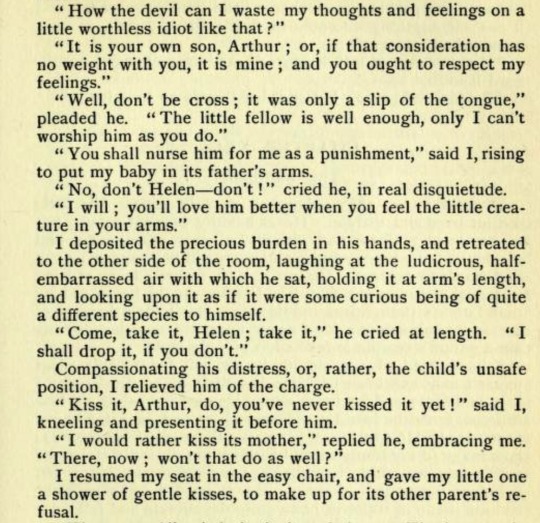


#the tenant of wildfell hall#anne brontë#literature#my analysis#my writing#english literature#romanticism#the bronte sisters#helen graham#arthur huntingdon#analysis#character analysis#books#classics#wildfell weekly
79 notes
·
View notes
Text
On my last reread of The Tenant of Wildfell Hall, I noticed something about Helen’s aunt and uncle that adds to the horror of the story, and to its generational patterns. There are a variety of indications that Helen’s uncle is similar to Huntington and his crowd, but her aunt cannot tell her so outright because it is not acceptable in their society for a woman to criticize her husband to others (or for a child to criticize a parental figure - and still less for a parental figure to teach a child to criticize their other parent).
The indications start in the very first scene from Helen’s point of view, where her aunt warns her repeatedly of the dangers and griefs of marrying an unprincipled person:
“Believe me, matrimony is a serious thing.” And she spoke it so seriously that one might have fancied she had known it to her cost…
The next indication is that her uncle wants her to marry a friend of his, Mr. Wilmot, whom Helen thinks is wicked and her aunt admits “is no saint”. Helen’s opinion is substantiated by a scene where Wilmot makes advances on her while drunk. Her aunt pushes another old suitor on her, Mr. Boarham, who Helen finds extremely aggravating and tiresome, but does not consider wicked. This suggests that Helen’s aunt is trying to get her married to someone ‘safe’ in hopes of keeping her away from both Mr. Wilmot and from untrustworthy men if Helen’s own age. The aunt doesn’t feel free to criticize her husband’s friend - she scolds Helen for saying Mr. Wilmot is wicked - but she clearly does not want Helen to marry him.
When Helen’s aunt describes the characterization of Arthur Huntingdon as “a bit wildish,” as meaning “destitute of principle, and prone to every vice that is common to youth,” Helen put her in a corner by noting that her uncle has said “he was a sad wild fellow himself, when he was young,”; her aunt can only reply with a stern shake of her head, and this thrust of her warnings is blunted.
Helen’s uncle continues to undermine her aunt’s attempts to keep Helen safe by inviting Mr. Huntingdon to their house in the gamebird-shooting season, and laughing at her aunt’s objections. When her aunt is very against Helen accepting him, her uncle laughs approvingly when Helen insists on her “Yes,” and gives his approval, and is supportive of them being married soon.
Now, all this exists in the context, later in the book, of Helen running away from her husband mainly to free her son from his corrupting influence (harms to herself, though severe, did not bring her to that decision). In that context, this feels like a generational pattern - that Helen’s aunt is trying to save her from making similar mistakes, in the same way that Helen is trying to save her son from following his father’s behaviour. But Helen’s aunt is trapped by convention. Married women of her time do not criticize their husbands outright - even Helen and her friend Millicent do not, when very unhappy in their marriages and subjected to their husbands’ violence and drunkenness. The past behaviour, and the chosen associates, of Helen’s uncle undermine her aunt’s warnings by normalizing the very behaviour her aunt deplores, and he deliberately overrides her aunt’s attempts to save her from a disastrous marriage. From the perspective of Helen’s aunt, the unfolding of her marriage to Mr. Huntingdon is a horrific form of déjà vu, a crushing failure to protect her niece, that she can guess at even through Helen’s silence on the matter.
90 notes
·
View notes
Text
I cannot BELIEVE Tenant of Wildfell Hall isn't more popular in classic lit/feminist circles. Rochester WHO?! Heathcliff WHAT?? Gilbert Markham is the only man I am aware of !!
#tenant#tenant of wildfell hall#anne bronte#bronte sisters#gilbert markham#helen graham#helen huntington#classic lit#classic literature#gothic literature#literature#dark academia
39 notes
·
View notes
Text
God damn this chapter was intense.
Anne Brontë really has a tight control over continuous scenes, and building tension because I FELT like I was present in that tea party with Mrs. Graham as Gilbert was fighting for his life while Eliza and Miss Wilson were slandering left and right.
Literally this while reading how Eliza and Miss Wilson plainly "implied" that Arthur was Mr. Lawrence's son.

#Damn who the fuck pissed in their tea#Gilbert was so confused and so angry this chapter#My autistic ass would never survive in this environment because I would go “No I don't understand please explain” until I snap#wildfell weekly#the tenant of wildfell hall#gilbert markham#helen graham#eliza millward#gif
32 notes
·
View notes
Text
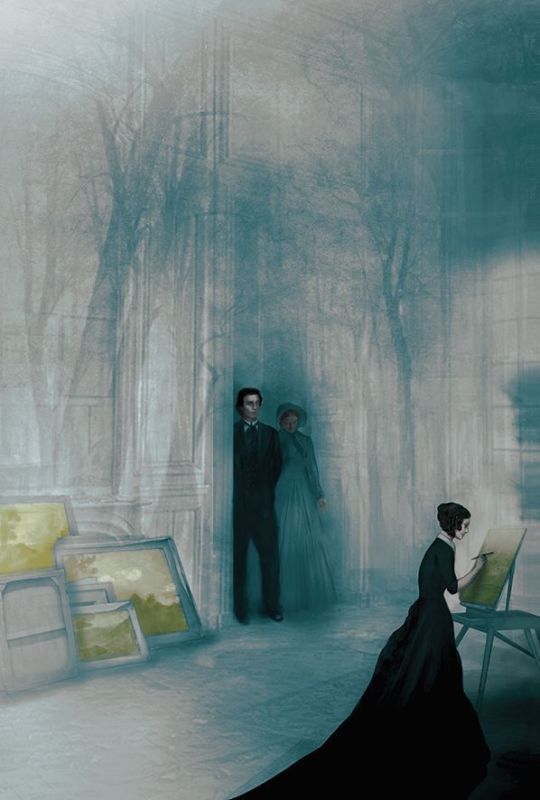
114 notes
·
View notes
Text
I'm reading The Tenant of Wildfell Hall by Anne Brontë. It has now become my favourite Brontë novel (I'm about 150 pages in). It's absolutely BEAUTIFUL. Gorgeous and haunting and a captivating plot and passionate characterisation. Helen Graham has become one of my favourite female protagonists. She's fearless and enigmatic (so far) and speaks her mind and wants to be treated as an equal and she seems like a wonderful, devoted mother to her little boy... And the novel is SO unreservedly scornful of the gender inequality of the times they lived in, the complete lack of autonomy especially with regards to marriage in Victorian society, and shows just how much women like Helen are punished simply for wanting to live their lives and make their choices.
I can't put it down and I can't praise this book enough. It deserves way, way more love than it gets.
6 notes
·
View notes
Text
The Byronic Hero Bracket: Qualifying Round Batch C #5
Helen Graham from The Tenant Of Wildfell Hall vs. Jess Mariano from Gilmore Girls

Reasons under the cut (spoilers for both)
(All sources from TV Tropes)
Helen Graham:
Another Bronte example. Anne Bronte's The Tenant of Wildfell Hall has a rare female example in the titular tenant, Helen Graham. She's reclusive, broody, an outcast to society because of her outrageous actions (by 19th-century English social norms), is plagued by her Dark and Troubled Past, and is really cold towards the narrator and her Love Interest, Gilbert Markham. That said, she's very determined and has her understandable reasons for why she committed taboos.
Jess Mariano:
Jess Mariano from Gilmore Girls. Jess is rebellious, irreverent, witty, and literary, and his troubled relationship with his parents leads him to act out. Jess manages to attract the main character (Rory) with his brooding, looks, and intellect.

#tournament poll#fandom tournament#tumblr tourney#character tournament#polls#poll bracket#tumblr polls#fandom bracket#tumblr bracket#character bracket#byronic hero#helen graham#the tenet of wildfell hall#jess mariano#gilmore girls
9 notes
·
View notes
Text
The Tenant of Wildfell Hall Thoughts: Chapters 24-28
Is there a better way to entretain your spouse on a rainy day than proudly brag about your fuckboi exploits? Huntingdon doesn't seem to think so. I'd read around he doesn't phisically abuse Helen, which I had taken to mean he doesn't have violent tendencies - would have made for an interesting contrast with Gilbert "The Facewhipper"- but alas, I was wrong! I was shocked when he hurled the book at the dog. I was also shoked when he called Helen a slut. By the time he alluded to Helen's pregnancy as a reason to "control his anger" I wasn't shocked anymore, but that scared me worse of all. I understand why it distresses Helen when he fuck's off to London for moths (specially that first time), but seeing what he's like I at home I wonder she doesn't enjoy the break, especially with him always returning with a chronic hangover and shithead friends.
You thought Lowborough's struggles with addiction where bleak? Huntingdon prays you hold his liqueur while he trows a sensible, innocent girl into marital misery. I feel so bad for Millicent. It is a testament to the importance of having a backbone. Not that I am blaming her for anything, mind you. I can't decide if I hate Huntingdon or her mother more for it.
Baby Arthur is born! Oh, joy. Of course Huntingdon would be jealous of his own baby. This is on chapter 28, the one mostly missing from the infamous mutilated version. I had a bit of a time with it, because I assumed it was cut for going too far, so when it turned out to be about Huntingdon being a cold, ambivalent, petty father I thought I must be missing something — thank you to @burningvelvet for directing me to an unabridged version (here) and @thatscarletflycatcher for COMPILING THE DIFFERENCES BETWEEN THE ORIGINAL AND MUTILATED TEXT OH MY GOD THIS IS SO USEFUL (here1, here2 and here3). Turns out, I had the complete copy all along. @burningvelvet has a great, insigtful post about chapter's 28 importance to the story as a whole (here), so all I'll add is, it says plenty that Huntingdon's ill feelings towards his son sent me on a wild goose chase, cause it seemed so mild compared with everything else.
#there are too many H surnames in this book#i'm starting to get lost#helen graham#arthur huntingdon#the tenant of wildfell hall#anne bronte#wildfell weekly#bronte blogging
7 notes
·
View notes
Text
One of the awesome things about The Tenant of Wildfell Hall (there are many) is how differently Gilbert and Helen's voices were written.
Both of them are writing an account of the past, but Gilbert feels far more "present". He stops to describe the landscape, his writing is extremely emotional, and passionate.
Helen's diary is far more matter of fact and it feels more like an objective recital of past events. She still displays strong emotions, but it feels "past".
Also, you can tell just by their word use that Helen is a well-educated member of the gentry and Gilbert just isn't, as much as he is well-read. He uses big words, but it feels slightly off, like he recently consulted a thesaurus. Sometimes he uses them specifically to show off to Helen. Which by the way, the fact that he's attracted to and not threatened by her intelligence, is so hot. Helen's command of language and vocabulary is much more natural and flowing. If anything, she simplifies her vocabulary when she speaks.
Being able to write first person POV of a man and a woman and make them so different in voice is just honestly amazing. It really feels like two different people wrote this book.
#the tenant of wildfell hall#gilbert markham#helen graham#writing voice#gilbert just has to tell you how pretty the sea was#HE HAS A MIGHTY NEED#anne brontë
54 notes
·
View notes
Text
The Tenant of Wildfell Hall (1968)
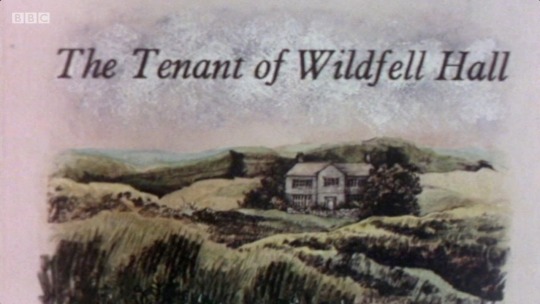
Did you know that before the 1996 version starring Tara Fitzgerald and Toby Stephens, there was another version of the same title which was released in 1968? It stars Janet Munro as Helen, Bryan Marshall as Gilbert Markham and Corin Redgrave as Arthur Hundington?
Here are some screenshots of 1968 version as seen on "The Brontës at the BBC" documentary:

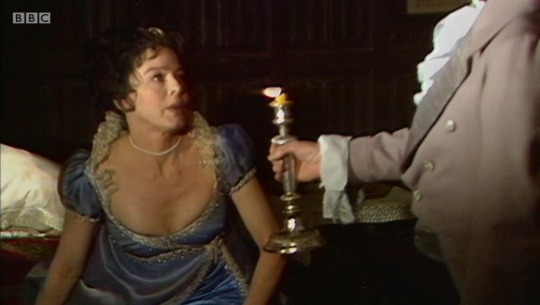
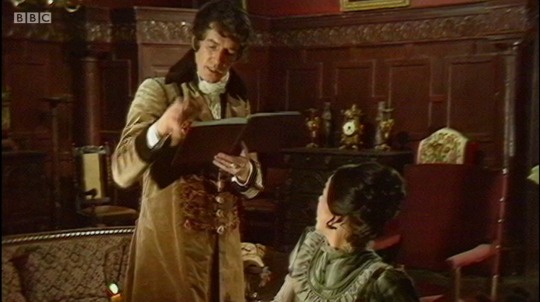



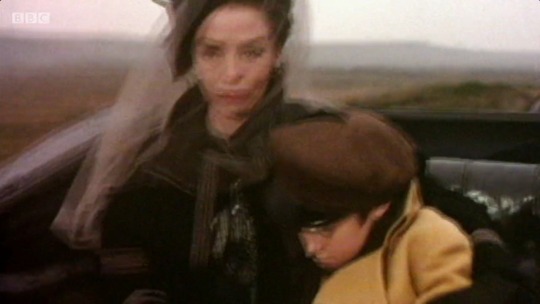

According to the documentary, this version of "The Tenant of the Wildfell Hall" is the first Brontë adaptation to be in full color. Unfortunately, this seemed to be difficult to be shown in public again as one of four of its episodes is currently missing.
#the tenant of wildfell hall#tenant of wildfell hall#the tenant of wildfell hall 1968#janet munro#anne bronte#bronte sisters#helen graham#helen hundington#gilbert markham#arthur hundington
13 notes
·
View notes
Text
“She is not determined to forget me. It would be wrong to forget one so deeply and fondly devoted to her, who can so thoroughly appreciate her excellencies and sympathise with all her thoughts as I can do, and it would be wrong in me to forget so excellent and divine a piece of God’s creation as she, when I have once so truly loved and known her.”
Anne Brontë | The Tenant of Wildfell Hall
#the tenant of wildfell hall#anne brontë#gilbert markham#helen graham#classical literature#the brontës
30 notes
·
View notes
Text

YOUR MIND???? im in awe of it @warrioreowynofrohan
#posting this so everyone sees it#jane eyre#the tenant of wildfell hall#charlotte brontë#anne brontë#character analysis#character parallels#helen graham#mr. rochester
35 notes
·
View notes
Text
The Tenant of Wildfell Hall - Chapter 38, “The Injured Man”
This chapter - the one where Lord Lowborough learns about Annabella and Huntingdon’s affair - is extremely interesting to me in relation to some of the things I learned in an undergrad history on Britain. (CW: Discussion of sucide.)
Starting in the 1700s, and continuing into the period when The Tenant of Wildfell Hall was written, there was a strong push among the growing middle classes for moral reform, and one of the things it targeted were vices that were specifically seen as common ones of the upper class: gambling, drunkenness, duelling, and suicide. The last one seems strange to the modern eye, but one element of its context was the image of the aristocrat who got badly into debt through the first three vices and killed themselves to escape disgrace (‘disgrace’ meaning ‘behaviour considered unfitting to the upper class’, like having to do work to earn money), to which the middle class were in effect responding “what, so you think an honest day’s work is literally a fate worth than death?”) The rest of the objection to it was the same as the objection to duelling: that both treated the balue of human life lightly. This was a sharp turn away from the older upper-class culture: the idea of suicide in dire straits as a virtue went back to Ancient Rome (and earlier, but I think Ancient Rome was the big reference point), and duelling had long been considered a necessary hallmark of the honourable man.
Lord Lowborough’s part in The Tenant of Wildfell Hall (which is deeply within the 1800s-British tradition of moral-didactic literature) is that of a man who has been tempted by all of these vices (as well as by drug abuse), succumbed to some, but ultimately refused all of them, and this chapter is the culmination of that. Earlier in the book Huntington laughingly tells of his friend’s earlier struggles and temptations, and how Huntington and the rest of their club urged him on in them and tempted him back whenever he attempted to quit: how Lowborough was first financially ruined by his gambling addiction, and then (in a striking example of addiction displacement) turned first to alcohol and then, as a displacement of alcohol, to laudanum to numb his unhappiness. He had ultimately managed to quit both, and married Annabella in hopes that marriage and domestic happiness could keep him on the straight and narrow. And he does actually stick with quitting them.
This chapter is the conclusion of that, and stands out for how different it is from the treatment of duelling in other (relatively) contemporary novels. In Sense and Sensibility, there’s a mention of Colonel Brandon fighting a duel with Willoughby over Willoughby’s seduction and abandoment of his ward; Elinor Dashwood does not exactly approve, but neither does she strongly object, and it narratively adds a certain romantic and dramatic gloss to Colonel Brandon. It is not treated as a vice, but as a difference between female/male and civilian/soldier values (and moderated by the fact that it waa apparently a matter of form, and Brandon was not trying to kill him, as indicated by the lack of injury):
“we met by appointment, he to defend, I to punish his conduct. We returned unwounded, and the meeting, therefore, never got abroad.”
Elinor sighed over the fancied necessity of this; but to a man and a soldier, she presumed not to censure it.
In Jane Eyre, Rochester also mentions, in the past, having a duel with the man who had been sleeping with his mistress Céline Varens. As with Colonel Brandon, this isn’t regarded as praiseworthy, but it does give him a more dramatic figure.
“Next morning I had the pleasure of encountering him; left a bullet in one of his poor etiolated arms, feeble as the wing of a chicken in the pip, and thought I had done with the whole crew.”
In contrast, The Tenant of Wildfell Hall has Helen effusively praise Lowborough for refusing to fight a duel, in the teeth of his friends’ condemnation of that decision as weak and cowardly. It’s not mildly tut-tutting at duelling: it’s flipping the aristocratic script by presenting refusal to duel under circumstances that would normally prompt one as actively morally courageous.
[The first speaker is Hattersley, one of Lowborough and Huntingdon’s friends.]
“If you’ve the heart of a man, it would be the very ticket for you. It’s just this, my lad,” he continued, rather lowering his voice, but not enough to prevent me from hearing every word he said, though the half-closed door stood between us: “I think you’re an ill-used man—nay, now, don’t flare up—I don’t want to offend you: it’s only my rough way of talking. I must speak right out, you know, or else not at all; and I’m come—stop now! let me explain—I’m come to offer you my services, for though Huntingdon is my friend, he’s a devilish scamp, as we all know, and I’ll be your friend for the nonce. [This is Hattersley offering to be his second in a duel.] I know what it is you want, to make matters straight: it’s just to exchange a shot with him, and then you’ll feel yourself all right again; and if an accident happens—why, that’ll be all right too, I daresay, to a desperate fellow like you. Come now, give me your hand, and don’t look so black upon it. Name time and place, and I’ll manage the rest.”
“That,” answered the more low, deliberate voice of Lord Lowborough, “is just the remedy my own heart—or the devil within it, suggested—to meet him, and not to sever without blood. Whether I or he should fall, or both, it would be an inexpressible relief to me, if—”
“Just so! Well then—”
“No!” exclaimed his lordship, with deep, determined emphasis. “Though I hate him from my heart, and should rejoice at any calamity that could befall him—I’ll leave him to God; and though I abhor my own life, I’ll leave that, too, to Him that gave it.”
“But you see, in this case,” pleaded Hattersley—
“I’ll not hear you!” exclaimed his companion, hastily turning away. “Not another word! I’ve enough to do against the fiend within me.”
“Then you’re a white-livered fool, and I wash my hands of you,” grumbled the tempter, as he swung himself round and departed.
“Right, right, Lord Lowborough,” cried I, darting out and clasping his burning hand, as he was moving away to the stairs. “I begin to think the world is not worthy of you!”
Lowborough’s rejection of duelling is also a rejection of suicide (“and though I abhor my own life, I’ll leave that to Him that gave it”), and this rejection in spite of strong temptation is further emphasized:
I lay awake the greater part of [the night] listening to his heavy step pacing monotonously up and down his dressing-room, which was nearest my chamber. Once I heard him pause and throw something out of the window with a passionate ejaculation; and in the morning, after they were gone, a keen-bladed clasp-knife was found on the grass-plot below; a razor, likewise, was snapped in two and thrust deep into the cinders of the grate, but partially corroded by the decaying embers. So strong had been the temptation to end his miserable life, so determined his resolution to resist it.
Helen’s internal thoughts give further praise of Lowborough, and condemn the social values that make being cheated on a greater source of shame and condemnation for a man than cheating is:
"That man," I thought, "is an object of scorn to his friends and the nice-judging world. The false wife and the treacherous friend who have wronged him are not so despised and degraded as he; and his refusal to avenge his wrongs has removed him yet farther beyond the range of sympathy, and blackened his name with a deeper disgrace. He knows this; and it doubles his burden of woe. He sees the injustice of it, but he cannot bear up against it; he lacks that sustaining power of self-esteem which leads a man, exulting in his own integrity, to defy the malice of traducing foes and give them scorn for scorn—or, better still, which raises him above earth's foul and turbulent vapours, to repose in Heaven's eternal sunshine. He knows that God is just, but cannot see His justice now: he knows this life is short, and yet death seems insufferably far away; he believes there is a future state, but so absorbing is the agony of this that he cannot realize its rapturous repose. He can but bow his head to the storm, and cling, blindly, despairingly, to what he knows to be right. Like the shipwrecked mariner cleaving to a raft, blinded, deafened, bewildered, he feels the waves sweep over him, and sees no prospect of escape; and yet he knows he has no hope but this, and still, while life and sense remain, concentrates all his energies to keep it. Oh, that I had a friend's right to comfort him, and tell him that I never esteemed him so highly as I do this night!"
I feel that Anne Brontë was trying to make women’s rights - specifically, the right to 1) be treated as morally and intellectually equal to men, and not as either angels to inspire or delicate flowersto be preserved; 2) be taught the dangers of a bad marriage fully and frankly in order to avoid them; 3) leave an abusive marriage, and to have forms of abuse other than physical abuse recognized as abuse, and to keep custody of their children on leaving such a marriage; and 4) have some way of earning a respectable independent living upon leaving such a marriage - an integrated part of the wider moral reform movement, and both those threads are strongly present throughout her book. (In some respects this succeeded, at least insofar as the suffrage movement and the temperance movement were very closely tied together. It’s not always remembered enough that a huge element of the temperance movement was the right to not have your husband be drunk all the time (often leading to violence) and waste all your money.)
#the tenant of wildfell hall#wildfell weekly#anne bronte#helen graham#lord lowborough#cw suicide#tw suicide
25 notes
·
View notes
Text
Finished The Tenant of Wildfell. Definitely made me feel like when I read The Story of Avis when Helen is writing about her marriage.
Well, where do I begin... I love it! Truly, thank you so much @thatscarletflycatcher for the recommendation. Any good adaptation?
Helen really missed all the red flags, didn't she? But to be fair he did present himself as a good person. At the very least, at that moment he rescued her from Lowborough. He fooled me too.
When you think it couldn't get worse, it did! The fear I felt when he discovered her first flight attempt. It was a good plan, and it showed she had the capacity to make a living by herself through her art. But, god that was tough.
But the highlight for me is this:
"Is your love all earthly, then?"
THAT CONVERSATION!!!!!! OMG!!!!! I don't think I have ever read anything similar.
I don't know how Gilbert managed to wait for so much time. And then, the idiocy of them both, "I didn't ask about you because you didn't ask about me" Seriously!
25 notes
·
View notes